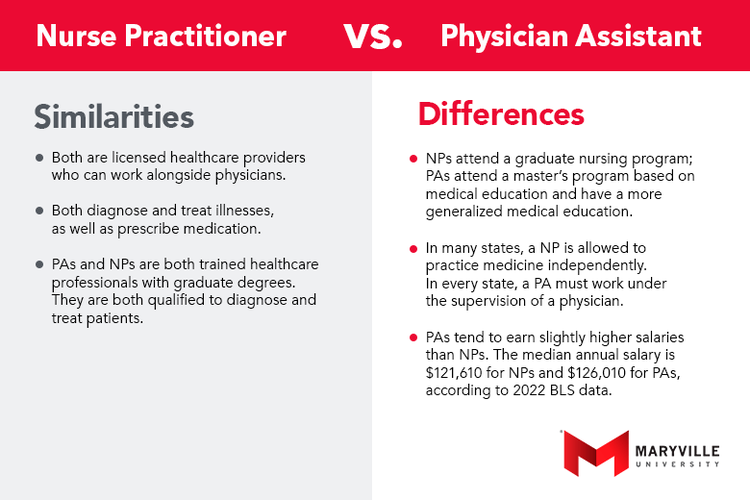Family Nurse Practitioner vs. Physician Assistant: Understanding the Differences

As someone interested in pursuing a career in healthcare, you may have come across the terms family nurse practitioner (FNP) and physician assistant (PA).
While both professions are similar in many ways, some key differences set them apart.
This article will explore the similarities and differences between FNPs and PAs and help you decide which path may be right for you.
What is a family nurse practitioner?
A family nurse practitioner (FNP) is a registered nurse who has completed advanced education and training in diagnosing and treating common medical conditions.
FNPs work with patients of all ages, from infants to seniors, and provide a wide range of primary care services, such as physical exams, immunizations, and health screenings. They can also diagnose and treat acute and chronic illnesses, prescribe medications, and order diagnostic tests.
To become an FNP, you must obtain a Bachelor of Science in Nursing (BSN) degree and pass the National Council Licensure Examination for Registered Nurses (NCLEX-RN).
After gaining some experience as a registered nurse, you can then pursue a Master of Science in Nursing (MSN) degree with a specialization in family practice. This typically takes two to three years to complete and includes clinical rotations in various healthcare settings.
What is a physician assistant?
A physician assistant (PA) is a healthcare professional who works under a licensed physician's supervision.
PAs perform many of the same duties as physicians, including taking medical histories, performing physical exams, ordering and interpreting diagnostic tests, and prescribing medications. They can also assist in surgical procedures and provide patient education and counseling.
To become a PA, you must first obtain a bachelor's degree in a healthcare-related field and complete prerequisite coursework in anatomy, physiology, and other sciences. You must then apply to a PA program, which typically takes two to three years to complete and includes classroom instruction and clinical rotations in various specialties.
Is a PA more senior than an FNP?
No, neither profession is considered more senior than the other. FNPs and PAs are highly skilled healthcare professionals who work collaboratively with physicians and other healthcare team members to provide quality patient care. The main difference between the two is their educational background and training.
Another difference between FNPs and PAs is their scope of practice. While both professions can diagnose and treat medical conditions, FNPs have a broader scope of practice regarding nursing interventions.
For example, FNPs can provide prenatal care, deliver babies, and perform gynecological exams, while PAs cannot.
Additionally, FNPs provide holistic care that addresses not only the physical aspects of health but also patients' emotional and social needs.
Are nurse practitioners and PAs the same?
No, nurse practitioners and PAs are not the same.
While both professions share some similarities, they have different educational backgrounds and training.
Nurse practitioners are registered nurses who have completed advanced education and training in a specific area of practice, while PAs are healthcare professionals who work under the supervision of a licensed physician.
Is it harder to be a nurse practitioner or a physician assistant?
Both professions require significant education and training, so it’s difficult to say which is harder. The level of difficulty may depend on your strengths and interests.
If you enjoy nursing theory and practice, you may find the FNP path more fulfilling. The PA path may appeal more to you if you prefer medical theory and practice.
What’s the salary and job outlook for FNPs and PAs?
The median salaries are similar for FNPs and PAs.
According to the U.S. Bureau of Labor Statistics, the median salary for nurse practitioners, including FNPs, was $121,610 in May 2022, and $126,010 for PAs.
Both FNPs and PAs are in high demand. The job outlook for FNPs is projected to grow by 38% and 27% for PAs from 2022 to 2032.1,2
Family nurse practitioners and physician assistants play vital roles in the healthcare system.
While there are some differences between the two professions, they both offer rewarding careers with opportunities for growth and advancement. It's important to thoroughly research both paths and determine which aligns best with your interests and career goals.
Visit our admissions page for more information about how to apply for enrollment in one of our nursing programs.